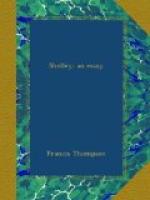of whom one sees, as she hangs mourning over him,
Upon the silken fringe of his faint
eyes,
Like dew upon a sleeping flower,
there lies
A tear some dream has loosened from
his brain!
Lost angel of a ruined Paradise!
She knew not ’twas her own;
as with no stain
She faded like a cloud which hath
outwept its rain.
In the solar spectrum, beyond the extreme red and extreme violet rays, are whole series of colours, demonstrable, but imperceptible to gross human vision. Such writing as this we have quoted renders visible the invisibilities of imaginative colour.
One thing prevents Adonais from being ideally perfect: its lack of Christian hope. Yet we remember well the writer of a popular memoir on Keats proposing as “the best consolation for the mind pained by this sad record” Shelley’s inexpressibly sad exposition of Pantheistic immortality:
He is a portion of the loveliness
Which once he made more lovely,
etc.
What desolation can it be that discerns comfort in this hope, whose wan countenance is as the countenance of a despair? What deepest depth of agony is it that finds consolation in this immortality: an immortality which thrusts you into death, the maw of Nature, that your dissolved elements may circulate through her veins?
Yet such, the poet tells me, is my sole balm for the hurts of life. I am as the vocal breath floating from an organ. I too shall fade on the winds, a cadence soon forgotten. So I dissolve and die, and am lost in the ears of men: the particles of my being twine in newer melodies, and from my one death arise a hundred lives. Why, through the thin partition of this consolation Pantheism can hear the groans of its neighbour, Pessimism. Better almost the black resignation which the fatalist draws from his own hopelessness, from the fierce kisses of misery that hiss against his tears.
With some gleams, it is true, of more than mock solace, Adonais is lighted; but they are obtained by implicitly assuming the personal immortality which the poem explicitly denies; as when, for instance, to greet the dead youth,
The inheritors of unfulfilled renown
Rose from their thrones, built beyond
mortal thought
Far in the unapparent.
And again the final stanza of the poem:
The breath whose might I have invoked
in song
Descends on me; my spirit’s
bark is driven
Far from the shore, far from the
trembling throng
Whose sails were never to the tempest
riven;
The massy earth, the sphered skies
are given:
I am borne darkly, fearfully afar;
Whilst, burning through the inmost
veil of heaven,
The soul of Adonais like a star
Beacons from the abode where the
eternal are.
The Soul of Adonais?—Adonais, who is but
A
portion of the loveliness
Which once he made more lovely.




